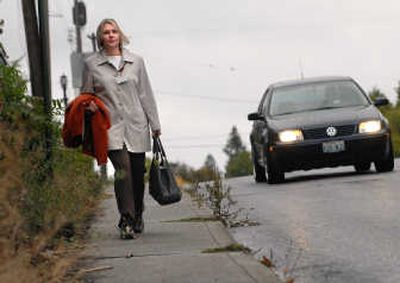Thieves keep car owners on their toes – literally

Shannon Jordan had to walk to work on Tuesday, a blustery fall day. Her Subaru was recently stolen.
Brad Thompson is also walking to work these days. His Toyota Camry was stolen – for the third time in two months – from his North Side apartment complex.
In the last two months, nearly 500 cars have been stolen in Spokane, up slightly from last year.
Authorities say the chronic problem has been made worse by weak sentencing for those who steal automobiles – many of whom are repeat offenders – and not enough people to investigate all the thefts.
“The jail is so backed up with violent criminals that those who commit property crimes aren’t held,” said Spokane police Sgt. Keith Cummings.
Plus, “It’s not too sexy, so to speak, so the jail time isn’t much,” Cummings said.
Authorities say that when they arrest some of the more prolific car thieves, a drop in stolen cars can be detected immediately, but only for a short time. Until last July, a person had to be caught seven times before facing significant time behind bars.
That changed because the Legislature adopted House Bill 1001, which mandates stiffer penalties.
“The major difference is how previous offenses are counted,” said Spokane County Deputy Prosecutor Stefani Collins.
A person convicted once of auto theft gets a longer sentence with the next conviction.
“Hopefully the new law will have a deterrent effect,” Collins said.
Washington is ranked sixth in the nation for auto theft. Spokane is 17th in the country based on a per-capita calculation of cities, according to the National Insurance Crime Bureau.
Meanwhile, Idaho is ranked 44th in the nation. Kootenai County fielded 82 stolen vehicle reports in 2005, 71 in 2006 and 55 so far this year, Kootenai County Sheriff’s Capt. Ben Wolfinger said.
And there’s good news in Coeur d’Alene, where auto theft dropped 40 percent, from 87 during the first eight months of 2006 to 52 during the same period this year. The reason: Police caught a group of people who were stealing cars, said Liz Peterson, crime analyst for the Coeur d’Alene Police Department.
“Usually it stays pretty consistent, but you get spikes,” like last year, she said.
Many cars that are reported stolen are vehicles that have been loaned to acquaintances who don’t return them when expected, Peterson said.
“The other day, a young girl reported her vehicle stolen. She had just misplaced it at the mall,” she said.
In other cases, people go out drinking and by the end of the night have forgotten where they parked, Peterson said.
Cummings, who oversees property crime investigations, said most auto thefts in Spokane can be tied to drugs.
“What they are being used for most of the time is a meth taxi,” Cummings said. “People break into the cars, rifle through the inside and take anything of value. They drive it somewhere, transfer their stolen stuff to the next car, and the cycle continues.”
Investigators know the cars aren’t being stripped and sold for parts because police recover more than 80 percent of them, Cummings said. The national average for recovered stolen cars is 59 percent, said Frank Scafidi, a spokesman for National Insurance Crime Bureau.
Thompson’s Toyota has been found twice before. But not this time – so far.
His Camry is among the five most-stolen brands and models in Washington. Criminals use shaved keys, which fit multiple makes and models.
There are so many cars stolen in Spokane, police say they can’t investigate every one. So, they’re screened for “solvability,” Cummings said.
“For example, if someone wakes up and says, ‘Hey my car was stolen,’ there’s not much to go on there,” he said.
Typically an officer takes a report, and the stolen car is entered into a database. If it’s later found, officers check for fingerprints.
“If we have a good lead, we investigate,” Cummings said.